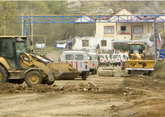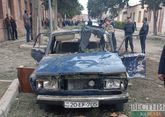The sensational statement by the OSCE Minsk Group co-chairs, urging the parties (in this case, Armenia) to refrain from actions and statements aimed at changing the negotiation format, was the subject of active discussions in Yerevan. Earlier, EU Commissioner Johannes Hahn in Brussels told Armenia's Prime Minister Nikol Pashinyan the same thing as the OSCE MG co-chairs - only being face-to-face.
After reviewing the international community's unambiguous statements, the Armenian Prime Minister rushed to Nagorno-Karabakh, where he held a meeting of the Security Council, attended by head of the Karabakh separatists Bako Sahakyan. It gave a rise to a number of speculations in the Armenian media about possible reasons for Pashinyan's hasty visit to Karabakh. "An emergency meeting of the Armenian Security Council in Artsakh is caused by the current deadlock situation," the 168 Zham newspaper wrote.
"Although the meeting's agenda was not officially announced, it is obvious that the need for such an urgent event appeared after the last statement of the OSCE Minsk Group co-chairs," the article says. The newspaper reminds that the co-chairs, not in targeted manner, but responded to Nikol Pashinyan’s statement about the return of Nagorno-Karabakh to the negotiating table, describing them as unacceptable attempts to unilaterally change the format of negotiations. "After this statement, the Armenian authorities have become deadlocked. On the one hand, Pashinyan cannot refuse his statements about the intention to return Nagorno Karabakh to the negotiating table, and on the other, he cannot participate in the negotiations, which will not discuss the issue of Nagorno-Karabakh's participation," the newspaper writes.
Following the Security Council meeting, the Armenian Prime Minister delivered a speech, which demonstrated that he did not want to change his position. The main points could be outlined as follows:
1. The Armenians of Nagorno-Karabakh represented by the unrecognized 'NKR' should be part of the talks, since Pashinyan, being the Prime Minister of Armenia, who was not elected by the Armenian population of Karabakh, is not authorized to represent 'NKR' himself. Unlike the Armenians, the Azerbaijanis of Nagorno-Karabakh, according to Pashinyan, should not participate in the negotiations, since their interests are already represented by President Ilham Aliyev.
2. Nikol Pashinyan needs a clear interpretation of the three principles and six points, presented by the OSCE Minsk Group as fundamental for solving the Nagorno-Karabakh conflict. "The protocols that do not give rise to discrepancies should be the basis of the negotiation process," the Armenian Prime Minister said.
3. "Preparing the Azerbaijani society for peace must be done by not only the Azerbaijani authorities, but also with the participation of the Armenian authorities. The awareness of it made me make a unprecedented for our reality statement in the National Assembly in the autumn of 2018, by saying that any solution to the Karabakh conflict must be acceptable for the people of Armenia, the people of Nagorno Karabakh and the people of Azerbaijan. It was my contribution to preparing for peace not only the peoples of Armenia and Nagorno-Karabakh, but also the people of Azerbaijan. Unfortunately, we don’t see adequate statements and actions from the President of Azerbaijan. In spite of this, I am ready to continue the dialogue with not only the President of Azerbaijan, but also the people of Azerbaijan, because I am certain that the people of Azerbaijan are as peace-loving as the peoples of Armenia and Nagorno-Karabakh," the head of the Armenian government said.
There is a short comment on each of the items. As for Nikol Pashinyan’s stubborn demands to include 'NKR' in the negotiation process, it can be noted that the authorities of a non-recognized republic a priori cannot be "legitimate". Moreover, no country or intergovernmental structure in the world recognizes so-called elections held in a separatist entity. 'NKR' is a gray area in international law, local elections are not recognized by the international community, and, accordingly, their 'president', 'ministers' and 'deputies' cannot be perceived as authorized representatives. Today, there is one way for Bako Sahakyan and his associates to get at least some degree of international legalization. At the first stage, the separatist regime should start a dialogue with the Azerbaijani community of Nagorno-Karabakh, and having received an intermediate status recognized by official Baku after the liberation of the occupied territories around Nagorno-Karabakh, join the negotiations with the Azerbaijani government.
Everyone in the world understands: there are regular units of the Armenian Armed Forces in the 'NKR', and 80% of the soldiers serving there are also recruited from Armenia. Finally, Nagorno-Karabakh's 'budget' is formed through direct transfers from the Armenian state budget. What kind of 'state' and 'people' can it be?
Second, the Armenian Prime Minister’s misunderstanding of the OSCE Minsk Group's three principles and the six points is surprising. For example, they have a point (perhaps the most problematic for Pashinyan) about the withdrawal of Armenian troops from the territories around Nagorno-Karabakh. In return, Nagorno-Karabakh receives security guarantees and an interim status. This is the absolute minimum needed to prevent a new bloodshed in Karabakh, which will break out sooner or later if the situation is not regulated. But didn’t Pashinyan himself loudly said that he rejects the 'territory in exchange for peace' formula? Doesn't Armenia's National Security Service Chief Artur Vanetsyan promise from Fizuli not to surrender "an inch of land" and discuss with the separatists the settlement of Fizuli and other occupied territories around Nagorno-Karabakh, from where all Azerbaijanis were expelled and where Armenians have never even historically lived (although history is not a justification for illegal territorial claims as well)? First of all, Pashinyan and his government should explain their interpretation of principles and points, and not demand it from the OSCE Minsk Group, which is nothing but an intermediary structure. Judging by Yerevan's statements, the current Armenian interpretation implies "everything for Armenia - nothing for Azerbaijan."
After that, Pashinyan’s "sincere" desire to engage in direct dialogue with the Azerbaijani people, who are "as peace-loving as the peoples of Armenia and Nagorno-Karabakh," cannot help but amuse. Again, there is no 'people' of Nagorno-Karabakh - there are only two communities, Armenian and Azerbaijani. The second was expelled by Armenia and the militants under its control, after which only the first community left in the region - strictly speaking, that's the whole people. Moreover, if Nikol Pashinyan decided to play humanism and communicate with the peace-loving, in his own words, Azerbaijani people, then there is plenty of topics for conversation. For example, he could begin by apologizing to the Azerbaijanis for the crimes of, for example, General Manvel Grigoryan, much-hated and imprisoned by him. After all, the fact is that Grigoryan boasted in an interview that he held captured Azerbaijanis as slaves for many years after the war. Not even mentioning massacres in Khojaly, Garadaghly and other Azerbaijani (now occupied) settlements, understanding that Pashinyan will not have enough political courage for this. But he could start by apologizing for Manvel's crimes, whose moral character is well known to Pashinyan himself. Such a step would in fact be "unprecedented," in contrast to the formal statement in parliament that a solution to the conflict must be acceptable to all, including Azerbaijanis. And if it is unacceptable for Azerbaijanis, then what will Armenia do - end the occupation? The question is, of course, rhetorical.










